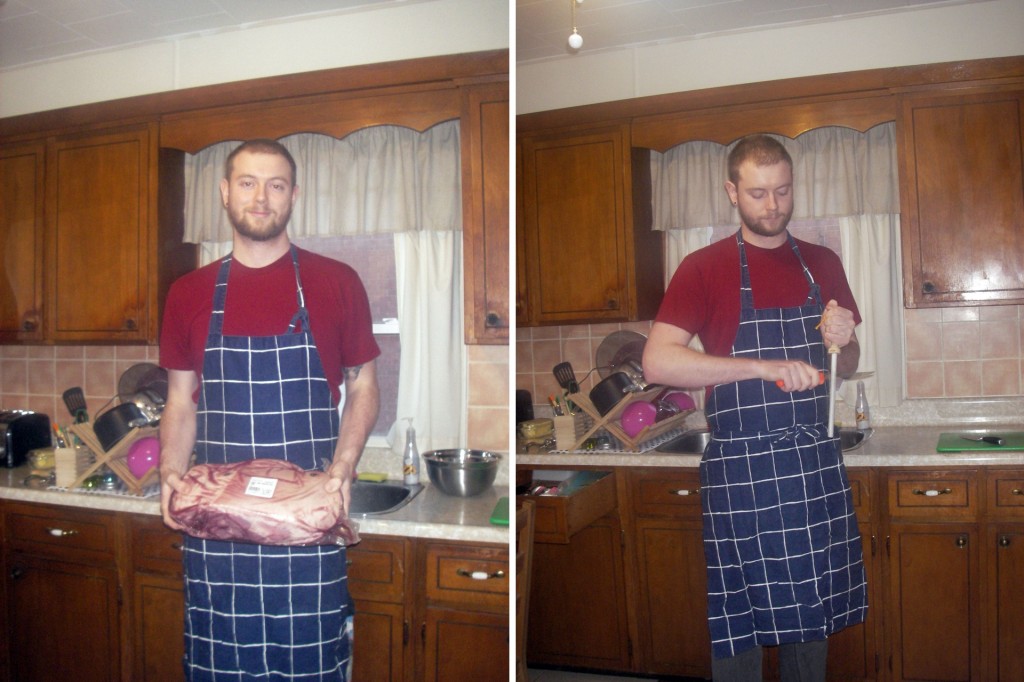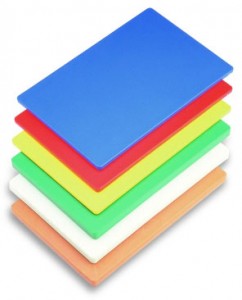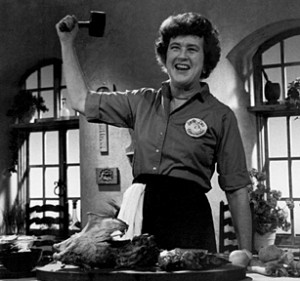Both my husband and I have spent many years throughout high school and college working in professional kitchens, so neither of us bats an eye when the other opens a jar of homemade turkey stock and writes the date on the lid, pulls out a knife steel and swings a giant knife around it or scrubs every surface of the kitchen every time the dishes are done (at least once a day when you don’t own a dishwasher, or invite one over for dinner). However, we do get strange looks when we do these things in front of friends who have never worked in real restaurants. To help all home cooks run a cleaner, safer, more organized kitchen, my husband and I have compiled a list of skills and knowledge only learned working in a restaurant that every home cook should be using in their own kitchen.
Rotate everything. To maintain freshness, save money and save that trip to the hospital with food poisoning, everything new brought into the kitchen should be placed behind/under the older things so that the older things will be used first. This applies to everything, even items with multi-year shelf lives.
Date everything that you open. When ever you open something and don’t use the full amount, a can of tomato paste for example, you should write the current date on the item and note how long you have to use it before it expires. This also applies to leftovers. Labelling anything you repackage can also be quite helpful.
Wash every surface of your kitchen – horizontal, vertical and otherwise – regularly. This, of course, includes the counters, sinks, fridges, floors, the over and ceiling fan blades.
Bleach is your best friend. Buy a cheap spray bottle, add one capful of bleach, top it up with water and wipe down every surface that will take it. (Make sure you know which surfaces could be damaged by the bleach, you don’t want to ruin your pretty things.)
Keep the inside of your oven clean. A clean oven is an efficient oven.
Label or colour code your cutting boards and never mix them up. You should have at least four cutting boards, one each for raw meat, cooked meat, fruit / vegetable, and grain / dairy. Use should use your bleach and water spray on these regularly, in addition to washing them in hot soapy water after every use.
Hands should be washed before you begin and after every time you touch, meat, eggs, your hair, your skin, your clothes, the phone, the light switch, etc. Long hair should be tied back and loose clothing and jewellery should be removed. (Clothing should be replaced with something more appropriate if you don’t want the doctors laughing at you in the emergency room.) Close-toed shoes are also a good idea if you are a dropper.
Wear an apron. It will protect you from more than just stains, an apron protects you from food splatter burns, hand burns when you drape it over your hands to touch a handle you are unsure of and leg burns when you drop something on yourself. It also gives you a quick place to wipe wet hands so you can keep a safe grip on your knives.
Keep a tea towel by the oven, on your apron, or in your back pocket for when you need to wipe your hands or don’t have time to grab and put on your oven mitts.
Prep everything you will need before you start cooking. This will keep the chaos down and help prevent cross contamination.
Keep your knives sharp with regular professional sharpening, at home honing with a knife steel or sharpening stone and proper care – i.e. keeping them out of the dishwasher, using a cutting board and not cutting through stupid things like sandy, unwashed leeks, or worse, aluminum cans. A sharp knife is a safe knife, most injuries happen because someone was forcing a dull knife through a slippery vegetable.
Keep your small appliances (blenders, mixers, food processors) clean, maintained and functioning normally. This will prevent unexpected malfunctioning and save you stress, time and money.
Organize your cupboards, drawers and fridge, and keep it that way. Know where everything goes so you can find it quickly and put it away correctly.
Have a fire extinguisher handy and keep it calibrated. Know how to put out the different kinds of fires that you can set in a kitchen – putting water on a grease fire is a very bad idea! Know when you are doing something dangerous and take the necessary precautions.



